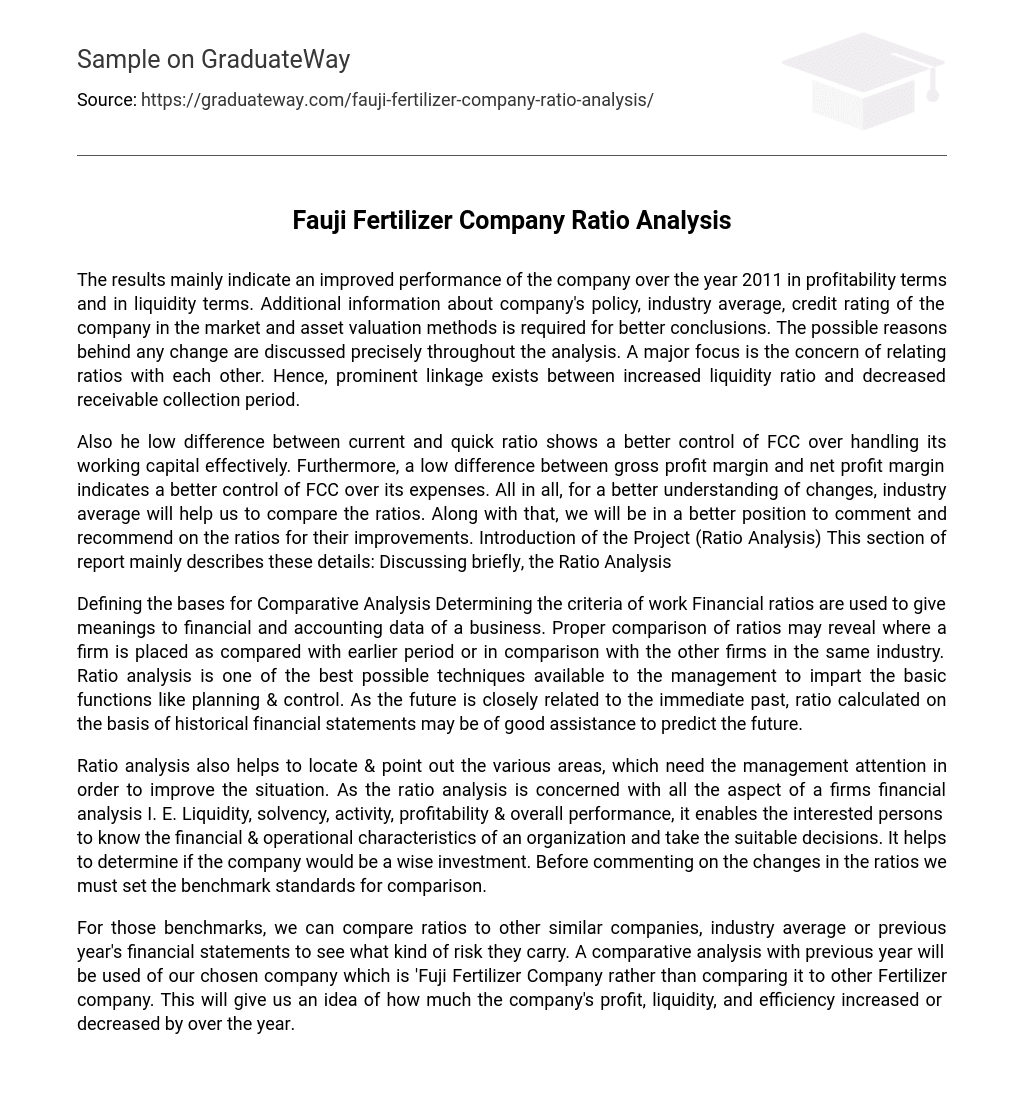The results mainly indicate an improved performance of the company over the year 2011 in profitability terms and in liquidity terms. Additional information about company’s policy, industry average, credit rating of the company in the market and asset valuation methods is required for better conclusions. The possible reasons behind any change are discussed precisely throughout the analysis. A major focus is the concern of relating ratios with each other. Hence, prominent linkage exists between increased liquidity ratio and decreased receivable collection period.
Also he low difference between current and quick ratio shows a better control of FCC over handling its working capital effectively. Furthermore, a low difference between gross profit margin and net profit margin indicates a better control of FCC over its expenses. All in all, for a better understanding of changes, industry average will help us to compare the ratios. Along with that, we will be in a better position to comment and recommend on the ratios for their improvements. Introduction of the Project (Ratio Analysis) This section of report mainly describes these details: Discussing briefly, the Ratio Analysis
Defining the bases for Comparative Analysis Determining the criteria of work Financial ratios are used to give meanings to financial and accounting data of a business. Proper comparison of ratios may reveal where a firm is placed as compared with earlier period or in comparison with the other firms in the same industry. Ratio analysis is one of the best possible techniques available to the management to impart the basic functions like planning & control. As the future is closely related to the immediate past, ratio calculated on the basis of historical financial statements may be of good assistance to predict the future.
Ratio analysis also helps to locate & point out the various areas, which need the management attention in order to improve the situation. As the ratio analysis is concerned with all the aspect of a firms financial analysis I. E. Liquidity, solvency, activity, profitability & overall performance, it enables the interested persons to know the financial & operational characteristics of an organization and take the suitable decisions. It helps to determine if the company would be a wise investment. Before commenting on the changes in the ratios we must set the benchmark standards for comparison.
For those benchmarks, we can compare ratios to other similar companies, industry average or previous year’s financial statements to see what kind of risk they carry. A comparative analysis with previous year will be used of our chosen company which is ‘Fuji Fertilizer Company rather than comparing it to other Fertilizer company. This will give us an idea of how much the company’s profit, liquidity, and efficiency increased or decreased by over the year. We will go into a lot of detail through the information we need to realize how smoothly or UN-smoothly the FCC is doing.
We will also look at the reasons for why the company is running the way it is, in the ‘comments and comparison section’ of this report. Introduction of the Company Fuji Fertilizer Company Origin: With a vision to acquire self – sufficiency in fertilizer production in the country, FCC was incorporated in 1978 as a private limited company. This was a Joint venture between Fuji Foundation and Halloo Tiptoes ASS of Denmark. Background: The initial share capital of the company was 813. 9 Million Rupees. The present share capital of the company stands above RSI. 8. 48 Billion. Additionally, FCC has more than 8.
Billion as long term investments which include stakes in the subsidiaries FALL, FACE and associate FCC. FCC commenced commercial production of urea in 1982. FCC participated as a major shareholder in a new TAP /Urea manufacturing complex with participation of major international/national institutions. The new company Fuji Fertilizer Bin Assam Limited (formerly FCC-Jordan Fertilizer Company Limited) commenced commercial production with effect from January 01 , 2000. The facility is designed with an annual capacity of 551 ,OHO metric tons of urea and 445,500 metric tons of TAP, revamped to 670,000 metric tons of TAP.
Current Position: Market position of FCC ranks very high in Pakistan as there are 60% shares of urea manufacturing and marketing. FCC believes in selling a programmer rather than Just a product. For this, the Company has adopted a customer oriented strategy, marketing its products backed by efficient and effective support services along with special emphasis on developing the market through practical and innovative farmer education. Thus, FCC is untiringly playing a very vital role in the agricultural development of Pakistan through provision of premium quality fertilizers besides, improving the livelihood of farming community.





